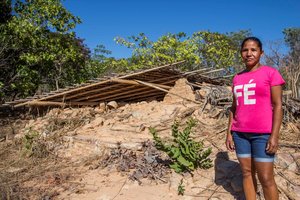The World Bank is financing a land titling, or “regularization” program in the Brazilian State of Piauí, where large areas of land have been grabbed from local communities and illegally occupied by agribusiness. Local communities, including communities of descendants of runaway slaves (quilombolas) as well as indigenous peoples, are being violently displaced from their traditional lands and face contamination of water and soils, increasing violence against community leaders, deforestation and loss of biodiversity.
Through a 120 million USD loan, the World Bank thus supports a land titling program that risks sanctifying these land grabs and paving the way for a new rush of 'legalized' land grabbing, with more catastrophic social and environmental consequences.
As the World Bank hosts its annual Land and Poverty Conference in Washington D.C., from 19-23 March 2018, Brazilian social organizations and their international partners and supporters are calling for the Bank to suspend its support for the land titling program in Piauí and to respond to the demands of affected communities.
The World Bank project contains no concrete safeguards to ensure that it actually secures people’s tenure rights against dispossession by local agribusiness and speculators, and to guarantee that it does not formalize the dispossession of communities in the context described above. As such, the project does not close the gaps of the state of Piauí’s law on land regularization and is not in line with the UN Guidelines on the Responsible Governance of Tenure of Land, Fisheries and Forests (Tenure Guidelines).
The Brazilian Public Prosecutor’s Office intervened on December 18, 2017 by issuing a formal recommendation to the World Bank to suspend the land program and to adopt measures to remedy the violations of the land rights of traditional peoples and communities that have already occurred. [1] The World Bank has yet to respond.
We call upon the World Bank to:
- Comply with the recommendations contained in the Brazilian Public Prosecutor’s Office’s letter by immediately suspending the project “Piauí: Pillars of Growth and Social Inclusion” and the land regularization/titling process in Piauí.
- Respond to the demand of affected communities – which is supported by the Public Prosecutor’s Office – to establish a dialogue round table with the objective of assessing the effects of the World Bank-financed land regularization program in Piauí, in order to prevent and remedy violations and to put in place mechanisms, which guarantee local communities control over their territories as well as effective remedies, including the restitution of community lands. The round table should involve representatives of the affected communities, the agrarian court of the state judiciary (Vara Agrária da Justiça Estadual), the Land Institute of Piauí (Instituto de Terras do Piauí, INTERPI), the state and federal offices of the Public Prosecutor, the State Parliament of Piauí, FAO and support groups from civil society. This dialogue round table should be convened by FAO as the leading UN agency for the implementation of the Guidelines on the Responsible Governance of Tenure of Land, Fisheries and Forests.
- To publicly disclose how the land titling/regularization project in Piauí and any other loans, projects and operations the World Bank is involved with, are in compliance with the Guidelines on the Responsible Governance of Tenure of Land, Fisheries and Forests.
[1] www.fian.org/fileadmin/media/publications_2017/Letters_and_statements/Recomendac__a__o_MPF.pdf.
This statement is endorsed by the following organizations and networks:
Ação Acadêmica para o Desenvolvimento das Comunidades Rurais, Moçambique
ActionAid Brazil
ActionAid USA
Amazon Watch
Articulação Nacional das Pescadoras, Brazil
Articulação Piauiense dos Povos Impactados pelo MATOPIBA, Brazil
Associação dos Advogados dos Trabalhadores Rurais, Brazil
Associação dos Povos Indígenas do Brasil
Campanha Nacional em Defesa do Cerrado, Brazil
Caritas Piauí, Brazil
Centro de agricultura alternativa do Norte de Minas Gerais, Bazil
Centro Internazionale Crocevia, Italy
Coletivo das Comunidades de Fundo e Fecho de Pasto, Brazil
Comissão de Povos Originários Populações e Comunidades Tradicionais do Fama 2018, Brazil
Comissão Nacional de Fortalecimento de Reservas Extrativistas e dos Povos Extrativistas Costeiros e Marinhos, Brazil
Comissão Pastoral da Terra (CPT), Brazil
Community Alliance for Global Justice, USA
Conselho Indigenista Missionário (Cimi), Brazil
Conselho Pastoral dos Pescadores, Brazil
Coordenação Nacional da Articulação das Comunidades Negras Rurais Quilombolas, Brazil
Development and Peace - Caritas Canada
Eco Ruralis, Romania
Environmental Rights Action/Friends of the Earth Nigeria
Family Farm Defenders, USA
Federação de Órgãos para Assistência Social e Educacional (FASE), Brazil
FIAN Belgium
FIAN BRASIL
FIAN Germany
FIAN International
FIAN Sweden
Focus on the Global South
Friends of the Earth US
Global Exchange, USA
GRAIN
Grassroots Global Justice Alliance, USA
Grassroots International, USA
HEKS/EPER, Switzerland
Housing and Land Rights Network – Habitat International Coalition
Inclusive Development International, USA
Institute for Agriculture and Trade Policy, USA
Instituto Mais Democracia, Brazil
Instituto Sociedade Proteção e Natureza, Brazil
International Indian Treaty Council (IITC), USA
Just Foreign Policy, USA
La Via Campesina
Maryknoll Office for Global Concerns, USA
Masifundise, South Africa
Movimento dos Trabalhadores Rurais Sem Terra (MST), Brazil
Movimento Interegional das Quebradeiras de Coco Babaçu, Brazil
Movimento Trabalhadores Camponeses, Brazil
Movimentos dos Pescadores e Pescadoras Artesanais, Brazil
National Family Farm Coalition, USA
Observatório das Nacionalidades, Brazil
Presbyterian Ministry at the United Nations, Presbyterian Church, USA
Rede Pantaneira, Brazil
Rede Social de Justiça e Direitos Humanos, Brazil
Sierra Leone Network on the Right to Food
Solidarity Sweden - Latin America (SAL)
Terra Nuova, Italy
Universidade Estadual do Ceará (UECE), Brazil
US Food Sovereignty Alliance (USFSA)
WhyHunger, USA
World Forum of Fisher Peoples
Source: FIAN international
